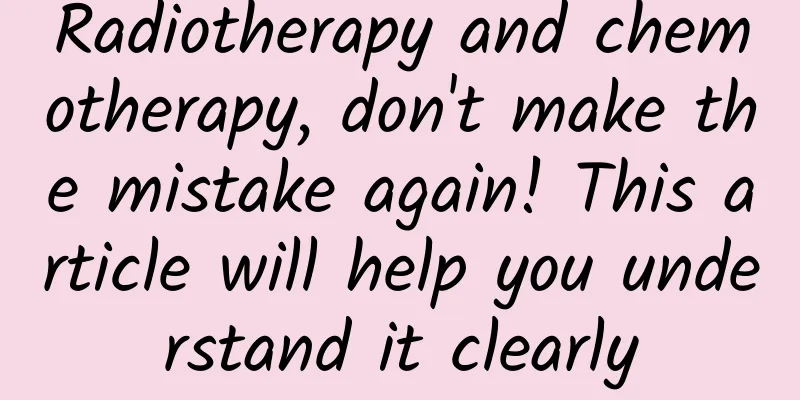Radiotherapy and chemotherapy, don't make the mistake again! This article will help you understand it clearly

|
Aunt Luo from Yanling developed unexplained black stools three months ago, occasionally with blood in the stools, urgent bowel movements, increased frequency, and lower abdominal pain. She underwent colonoscopy and biopsy at a local hospital, which showed a malignant tumor of the rectum. In order to seek further treatment, Aunt Luo found Dr. Chen Ming from the Third Department of Oncology at Hunan Provincial Hospital of Traditional Chinese Medicine . Dr. Chen Ming said that chemotherapy and radiotherapy were necessary. Aunt Luo asked anxiously: "Doctor Chen, what is the difference between chemotherapy and radiotherapy? Can I bear the side effects of chemotherapy? Will all my hair fall out?" Dr. Chen Ming replied: Radiotherapy is a treatment method that uses high-energy rays or particles to destroy cancer cells . It uses the principle of radiation to kill cells, especially tumor cells, because tumor cells are more unstable than normal cells and more sensitive to radiation. This means that these rays or particles can penetrate body tissues and directly act on cancer cells, causing them to be damaged and die. Radiotherapy is usually used for local treatment, treating tumors in specific parts of the body , but it is ineffective for tumor cells in other parts of the body. This targeted treatment makes radiotherapy an indispensable part of cancer treatment. Chemotherapy uses drugs to kill cancer cells or prevent them from growing and multiplying . Chemotherapy drugs can be given to patients orally or intravenously, and after entering the blood circulation, they can reach all parts of the body, thereby treating cancer cells throughout the body. Chemotherapy is usually used to treat widely spread cancer, or to prevent cancer cells from recurring after surgery or radiotherapy. It not only works on the local tumor, but also on other tumor cells in the body that may metastasize. Most patients need 10-30+ radiotherapy sessions, usually from Monday to Friday, once a day, 5-15 minutes each time , with rest on Sundays and Saturdays, and the required time is 2-7 weeks. For patients with mild radiotherapy reactions, radiotherapy can be performed as an outpatient without hospitalization. Most patients need to complete 4-12 cycles of chemotherapy , with each cycle separated by 2-4 weeks, and the time required varies from 3 to 6 months . Because intravenous chemotherapy takes a long time and has relatively large side effects, doctors generally recommend hospitalization for chemotherapy. Doctor Chen Ming comforted Aunt Luo, saying, " Radiotherapy has fewer side effects than chemotherapy , and systemic reactions are less common. Side effects mainly occur in the radiotherapy area, that is, wherever the radiotherapy is applied, there will be reactions . Such as radiation dermatitis, radiation stomatitis, radiation pharyngitis, etc., the reactions gradually worsen with the progress of radiotherapy. With proper treatment and the end of radiotherapy, these reactions will be relieved and recovered. The side effects of chemotherapy are usually more obvious , mainly systemic reactions , such as nausea, vomiting, diarrhea, constipation, hair loss, low blood count, heart, lung, liver and kidney function damage, etc. As long as they are properly handled, severe heart, lung, liver and kidney function damage and "vomiting all the bitter bile water" are still very rare in clinical practice. With the advancement of medical technology, the toxic and side effects of radiotherapy and chemotherapy are gradually reduced . For example, the hair problem that your aunt is worried about, the hair will grow slowly after the chemotherapy is over! During chemotherapy, combined with traditional Chinese medicine treatment, such as moxibustion, ear acupoint pressing beans, acupoint plastering and Chinese medicine, can effectively relieve and prevent the toxic and side effects of radiotherapy and chemotherapy." After hearing Dr. Chen Ming's answer, Aunt Luo said, "It turns out that radiotherapy and chemotherapy are not as scary as I thought. Then I will listen to Dr. Chen and complete the radiotherapy and chemotherapy on time and in the right amount! Moreover, the Provincial Hospital of Traditional Chinese Medicine also has traditional Chinese medicine to assist my treatment. I believe I can stick to it!" In fact, each patient's situation is different and needs to be treated accordingly. A single treatment method has its shortcomings and is not enough to completely defeat the tumor. Only by choosing the right treatment plan and comprehensively utilizing multiple treatment methods (radiotherapy, chemotherapy, traditional Chinese medicine, etc.) can we maximize the extension of life and improve the quality of life. Hunan Medical Chat Special Author: Wu Xiaoqian, Department of Oncology, Hunan Provincial Hospital of Traditional Chinese Medicine Follow @湖南医聊 to get more health science information! (Edited by Wx) |
Recommend
Abdominal pain at 4 weeks pregnant
Pregnancy is a special ability of women and a nec...
What to do if breast pain and menstruation is delayed
Menstruation is something that female friends wil...
What are the symptoms of inflammation after curettage?
If a woman has an incomplete miscarriage, she wil...
How often should the cervical cancer vaccine be given?
The effectiveness of injected vaccines is limited...
Can type 16 positive be cured?
In daily life, diseases are always hiding around ...
What are the causes of brown vaginal discharge during pregnancy?
Pregnancy marks the beginning of a woman’s mother...
Can I eat seaweed soup during menstruation?
Menstruation is closely related to fertility. Onc...
Can I drink mung bean soup when I am pregnant?
For women who have just become pregnant, the qi a...
Breastfeeding weight loss should master these principles
Breastfeeding is a very healthy method nowadays. ...
Why is my period not coming for ten days late?
Women have menstruation every month. It is abnorm...
What medicine is good for lower body dryness?
Women's private parts need special attention ...
Pre-pregnancy test for mycoplasma infection
Pre-pregnancy check-up is a very important check-...
Why do I have back pain before my period?
Lower back pain before menstruation is caused by ...
What are the consequences of women not taking care of themselves?
Nowadays, many women pay great attention to maint...









